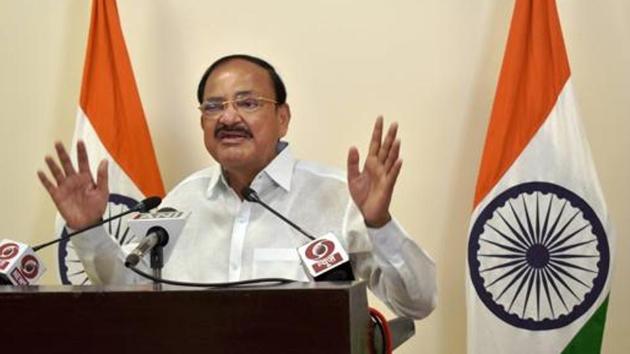Ban on firecrackers an example of judicial overreach, says Naidu
The vice president was speaking at the 80th presiding officers conference of Indian legislative bodies. This is the first time that the presiding officer of either House of Parliament has commented on this issue.
Vice president M. Venkaiah Naidu on Wednesday said the recent ban on firecrackers and the vehicle cess levied in Delhi had sparked a debate over judicial overreach and how “occasionally, concerns have been raised as to whether they (judiciary) were entering the domains of the legislative and the executive wings” .

The vice president was speaking at the 80th presiding officers conference of Indian legislative bodies. This is the first time that the presiding officer of either House of Parliament has commented on this issue. Naidu is the presiding officer of the Rajya Sabha.
Naidu’s comments, seeking clear boundaries for the three wings of the state—legislature, judiciary and executive—reflected the theme of the conference: “Harmonious coordination between legislature, executive and judiciary”.
President of India Ram Nath Kovind inaugurated the conference— his first public event after more than eight months—here in Gujarat. Under the chairmanship of Lok Sabha speaker Om Birla, the event will see a series of working sessions before Prime Minister Narendra Modi addresses the presiding officers on Thursday.
“There have been debates as to whether some issues should have been more legitimately left to the other organs of the government. For example, (the ban on) Deepavali fireworks; cess on registration and movement of vehicles from the National Capital Region through Delhi; banning use of vehicles after 10 or 15 years; monitoring police investigations; denying the executive any role in the appointment of judges by instituting a collegium which is said to be an extra-constitutional body; invalidating the National Judicial Appointments Commission Act seeking to ensure transparency and accountability (in judicial appointments) are being cited as instances of judicial overreach,” he said, emphasizing that no wing has supremacy over the other under the Indian Constitution
In 2014, the government decided to set up the National Judicial Appointments Commission, comprising the chief justice of India, two senior judges of the apex court, the Union law minister and two “eminent persons” to decide on the appointment and transfer of judges. The Supreme Court struck down the law enabling this in 2015. Senior judicial appointments continue to be made by the judges themselves, though the collegium, and while the government, through the law ministry, can ask the collegium to reconsider its choice, or delay signing off on it, it does not have veto power.
Lok Sabha Speaker Om Birla said “differences in institutions have emerged in the journey of democracy” and underlined that all three organs have “sufficient powers” to work. He emphasized “coordination” between the three wings and said all of them has a job to protect the public interest.
Naidu acknowledged that the higher judiciary has delivered several “far-reaching verdicts in furtherance of socio-economic objectives” and correctional interventions.
He also cited instances of legislative and executive excess such as rules under subordinate legislation violating provisions of original legislation or violations of rights and liberties by the executive that are “too visible for comfort.” He also mentioned 39th amendment to the Constitution placing the election of the president, vice president and prime minister beyond the scope of judicial scrutiny as legislative over-activism.
A harmonious relationship between three wings of the Indian state “warrants a spirit of mutual respect, responsibility and restraint. Unfortunately, there have been several instances of crossing the boundaries,” Naidu concluded.
Senior advocate Raj Panjwani said the legislature has the space “to correct all wrongs or actions which are detrimental to society.”
“The role of the judiciary is limited to testing the legality and competence of legislative and executive actions. The problem lies when the legislature fails to correct the wrongs that is a threat to the society at large and also to an individual’s fundamental rights. It is in this scenario, due to failure of the legislature as well as executive to take prompt and appropriate actions, in particular with issues concerning the environment, the Constitution empowers the judiciary to step in and fill up the vacuum caused by this inaction,” Panjwani added.
Get Current Updates on India News, Lok Sabha Election 2024 Live, Election 2024 along with Latest News and Top Headlines from India and around the world.




